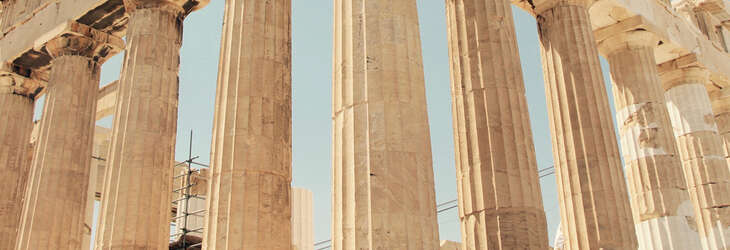The Modern Greek Culture course is worth one full-year credit. This course has limited space and is contingent on adequate enrolment. Classes will typically take place Monday through Wednesday mornings with field trips and activities often planned for Thursday and Friday. A detailed course schedule will be sent to admitted students. The course aims to provide students with a deep understanding of contemporary Greek culture and values, where elements of the Greek language, literature, food, and arts will be examined.
POL300Y0 Modern Greek Culture: People, Tradition, Language and Cuisine
This course explores Modern Greek culture in the context of the Mediterranean and European regions and with reference to the continuing Greek influence on western civilization. Hellenism has influenced the world since the ancient times. Starting from their remarkable contributions in philosophy, politics, science, architecture, history, music, theatre and literature, Greeks continue to impact our everyday lives through their language and culture. It is impossible to celebrate the liberties and responsibilities of democracy, to embrace the spirit of the Olympic games, to enjoy the flavours of Mediterranean cuisine or to feel the magic of a theatrical play, without revealing their Greek connections. The course analyzes important aspects of contemporary Greek society and its values along with elements of Greek language, literature, food, and arts.
Students will experience living and studying in glorious Athens, a European megalopolis surrounded by significant monuments and museums. Students will also explore some of the most famous destinations and picturesque regions of mainland Greece and Peloponese. Through lectures, readings, interaction with distinguished Greek professionals and educational excursions to sites of historical and cultural importance, students will have the opportunity to explore and analyze critically contemporary Greece. They will discover interesting aspects of a unique culture that remains resilient to regional and international challenges. The course is taught in English and there are no Greek language requirements.
Prerequisites: 1.0 POL credit or relevant academic preparation
Breadth Requirement = Society and Its Institutions (category 3)
POL300Y0 - 2026 Course Syllabus - Section 1 (Draft)
POL300Y0 - 2026 Course Syllabus - Section 2 (Draft)
Field Trips (tentative)
- Welcome dinner
- Orientation to Athens
- CYA Campus Orientation
- Visit museums such as the Acropolis Museum and Benaki Museum
- Visit the Greek Parliament
- Visit the Palace of Magistros and the Archaeological Museum
- Visit Melissokomiki Dodekannisou and Butterflies Valley and Springs
- Day trip to Delphi
- Day trip to Sounio
- Day trip to Nafplion
- Day trip to Kallithea Springs Lindos Acropolis and Asklipio Village
- Day trip to Symi Island
Instructor
Dr. Themistoklis Aravossitas teaches Modern Greek language and culture at the Centre for European, Russian and Eurasian Studies of the Munk School of Global Affairs and Public Policy, University of Toronto. He holds a Bachelor of Education from the University of Athens, Greece, an MA and a PhD from the Department of Curriculum Teaching and Learning of the Ontario Institute for Studies in Education and the Knowledge Media Design Institute. His research focuses on issues of teaching minority languages and the intersections of pedagogy, language, culture and identity. His latest research project involves the development of GREEKLANGUAGE.CA, a community-based portal that promotes Greek education in Canada. His publications include the books: Language Diversity in Greece: Local Challenges with International Implications, (Springer, 2020); Language Diversity and Education Matters (Gutenberg, 2019, in Greek); Interdisciplinary Research Approaches to Multilingual Education (Routledge Research in Language Education, 2018); Handbook of Research and Practice in Heritage Language Education (Springer International Handbooks of Education, 2018)
